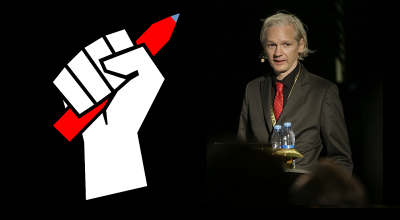‘All Journalists at Risk’ if Assange Handed to US Jailers

Mr Assange faces up to 175 years behind bars if convicted of charges relating to the publication of documents, video and diplomatic cables exposing US war crimes in Afghanistan and Iraq.
Intervening from the floor, National Union of Journalists president Tim Dawson said that we needed to urgently wake up to the “monstrous” case against Mr Assange.
“If successful this will place every journalist under fear of it being used against them,” he said, citing advice from the Law Commission to the Theresa May government which recommended legal changes to allow those in receipt of classified information to be prosecuted as well as those who leaked it.The Legal, Systemic and Reputational Implications of the Assange Case debate saw UN special rapporteur on torture Professor Nils Melzer describe the conclusions of two independent medical experts who examined Mr Assange that he was a victim of psychological torture.
“When I published information relating to Britain’s complicity in torture I knew I risked going to jail,” former British ambassador to Uzbekistan Craig Murray said. “But I’m shocked at the implication that the journalists who take and publish that information could go to jail.”
“I was sure the British government would investigate,” he said. “After all this is not some rogue state.”Yet all he received was an insulting tweet from then foreign secretary Jeremy Hunt accusing him of interfering in the British judicial system.
It took the government five months to formally reply to his report.
Pointing out that Mr Assange’s lawyers complained of being denied access to their client, he concluded:
“This case is in the hands of the public, because the judiciary has proved unable or unwilling to assure due process.”Human rights lawyer Clive Stafford-Smith said that governments in Britain and the US increasingly tried to conflate “national security with political embarrassment,” while former New York Times general counsel James Goodale warned that the arrest of Glenn Greenwald in Brazil indicated other governments were already using the precedent of Assange’s prosecution to clamp down on critical journalism.
The debate, which took place under Chatham House Rules, also heard from journalist Peter Oborne on his dismay at the willingness of so many journalists to ignore or collude in the prosecution of Mr Assange.
Mr Oborne warned that the “rule of law, parliamentary democracy and free speech” were under attack across the West.
Former Foreign Office official Claire Smith spoke about the need for accountability on the part of organisations such as WikiLeaks.
It had been due to hear from former MI6 chief Sir Richard Dearlove, but he cancelled at late notice.
*
Note to readers: please click the share buttons above or below. Forward this article to your email lists. Crosspost on your blog site, internet forums. etc.
The original source of this article is Morning Star
Copyright © Ben Chacko, Morning Star, 2020

No comments:
Post a Comment